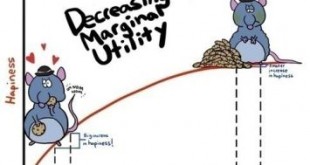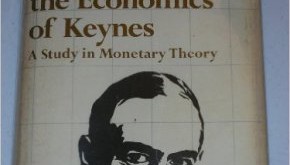Utility maximization — explaining everything and nothing Despite the rise of behavioral economics, many economists still believe that utility maximization is a good explanation of human behavior. Although evidence from experimental economics and elsewhere has rolled back the assumption that human agents are entirely self-interested, and shown that altruism and cooperation are important, a prominent response has been to modify individual preference functions so that they are...
Read More »Solow kicking Lucas & Sargent in the pants
Solow kicking Lucas & Sargent in the pants I think that Professors Lucas and Sargent really seem to be serious in what they say, and in turn they have a proposal for constructive research that I find hard to talk about sympathetically. They call it equilibrium business cycle theory, and they say very firmly that it is based on two terribly important postulates — optimizing behavior and perpetual market clearing. When you read closely, they seem to regard the postulate of optimizing...
Read More »John Searle on Economics
In a few seconds of partly facetious, partly very serious discussion. He’s not far from the truth either![embedded content]And, yes, as Searle says, we can indeed have an epistemologically objective science of economics, even though important things in economic life are subjective in a deeper sense (e.g., expectations, subjective utility) than just being “observer-relative.”The epistemologically objective science we need is Post Keynesian economics. Everything else is charlatanry,...
Read More »Mankiw on useless macroeconomics
Mankiw on useless macroeconomics The real world of macroeconomic policymaking can be disheartening for those of us who have spent most of our careers in academia. The sad truth is that the macroeconomic research of the past three decades has had only minor impact on the practical analysis of monetary or fiscal policy … The fact that modern macroeconomic research is not widely used in practical policymaking is prima facie evidence that it is of little use for this purpose. Greg Mankiw...
Read More »My blood’s so mad feels like coagulating
My blood’s so mad feels like coagulating [embedded content]
Read More »Axel Leijonhufvud a ‘New Keynesian’? No way!
Axel Leijonhufvud a ‘New Keynesian’? No way! Trying to delineate the difference between ‘New Keynesianism’ and ‘Post Keynesianism’ — during an interview a couple of weeks ago — yours truly was confronted by the odd and confused view that Axel Leijonhufvud was a ‘New Keynesian.’ I wasn’t totally surprised — I had run into that misapprehension before — but still, it’s strange how wrong people sometimes get things. The last time I met Axel, we were both invited keynote speakers at the...
Read More »The shaky mathematical basis of DSGE models
The shaky mathematical basis of DSGE models In most aspects of their lives humans must plan forwards. They take decisions today that affect their future in complex interactions with the decisions of others. When taking such decisions, the available information is only ever a subset of the universe of past and present information, as no individual or group of individuals can be aware of all the relevant information. Hence, views or expectations about the future, relevant for their...
Read More »Two reasons DSGE models are such spectacular failures
Two reasons DSGE models are such spectacular failures The unsellability of DSGE models — private-sector firms do not pay lots of money to use DSGE models — is one strong argument against DSGE. But it is not the most damning critique of it. To me the most damning critiques that can be levelled against DSGE models are the following two: (1) DSGE models are unable to explain involuntary unemployment In the basic DSGE models the labour market is always cleared – responding to a changing...
Read More »Why public debt is a good thing
Why public debt is a good thing The U.S. economy has, on the whole, done pretty well these past 180 years, suggesting that having the government owe the private sector money might not be all that bad a thing. The British government, by the way, has been in debt for more than three centuries, an era spanning the Industrial Revolution, victory over Napoleon, and more. But is the point simply that public debt isn’t as bad as legend has it? Or can government debt actually be a good thing?...
Read More »Preachers of austerity — false prophets
Preachers of austerity — false prophets We are not going to get out of the economic doldrums as long as we continue to be obsessed with the unreasoned ideological goal of reducing the so-called deficit. The “deficit” is not an economic sin but an economic necessity … The administration is trying to bring the Titanic into harbor with a canoe paddle, while Congress is arguing over whether to use an oar or a paddle, and the Perot’s and budget balancers seem eager to lash the helm...
Read More » Heterodox
Heterodox








